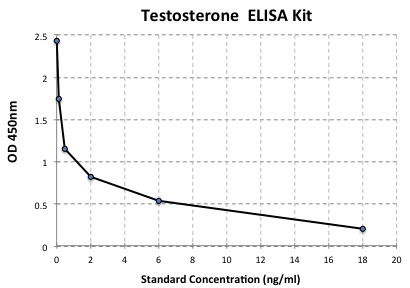More info
Testosterone, (17b-Hydroxy-4-androstene-3-one), a C19 steroid, is the most potent naturally secreted androgen. It is secreted by the Leydig cells of the testicles, the adrenals and the ovaries, and is the most important androgen secreted into the blood. In males, testosterone is secreted primarily by the Leydig cells of the testes; in females approximately 50% of circulating testosterone is derived from peripheral conversion of androstenedione, with the remainder from direct secretion of testosterone from the adrenal and ovarian glands. In males, testosterone levels increase during the last trimester of fetal life due to placental and fetal pituitary gonadotropin stimulation, and then decline and increase again 30-60 days postnatally. After this, testosterone concentrations decline to low levels in childhood. At the onset of male puberty, gonadotrophin secretion leads to increased testicular production of testosterone. In adult men, serum testosterone levels show a circadian variation, with peak levels in the morning.


